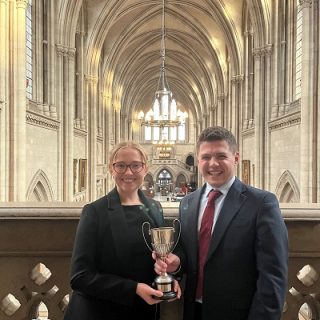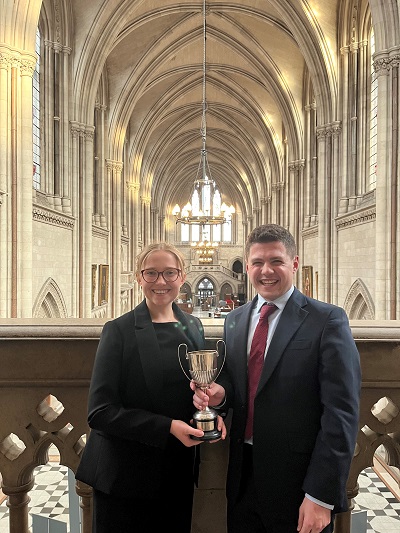We were delighted to hear that Joshua Neaman and Bethany Hermanszewska, GDL students at City during the 2021-22 academic year, made the finals of the Kingsland Cup, run by the chambers of Francis Taylor Building. We were even more thrilled to hear that they won! Here they both give us a rundown of the competition through their eyes…
The 2021-22 academic year saw the return of the Kingsland Cup and Prize Moot, a prestigious national moot organised annually by Francis Taylor Buildings. As baby GDLers, Beth and I had not only never heard of the competition but scarcely knew what a moot was at all. However, our judge in the first round of the City GDL Moot had participated in the previous year’s competition and thoroughly recommended it, and so we decided to throw our hat into the ring.
The first stage of the competition required us to draft a six-page skeleton argument for either side based on a lengthy moot problem. The Kingsland Cup traditionally focuses on public and human rights law, often intersecting with FTB’s particular specialism in planning and environmental law, and this year was no exception. The first round problem centred on Experimental Traffic Orders in the context of a low traffic scheme not dissimilar to the Low Traffic Neighbourhoods currently being rolled out across London. This was an area of law that our had never come up on our course and which neither of us had any prior experience in, but with the help of hours spent pouring over the Encyclopedia of Road Traffic Law and Practice we soon got to grips with the relevant law. After a frantic final week’s drafting in the run up to Christmas, not helped when I got Covid and had to isolate for the ten days leading up to the deadline, we got our skeletons in with five minutes to spare.
To our great surprise, given our last minute submissions and general lack of experience, we were one of only four teams selected to progress to the semi-finals. Slated to be held at the end of March, we would have to give oral submissions on the skeleton we had written for the Claimant’s side of the problem. Though Covid once again threw a spanner in the works by confining Beth to her flat the week before the moot, we dusted off the skeleton and began our prep. The moot was held in the FTB building and was judged by Mr Justice Peter Lane, President of the Immigration and Asylum Chamber of the Upper Tribunal. I spoke first and Beth spoke second. Though we faced stiff competition from a team of fellow City students, at the end of a hard fought contest we were declared the winners.
The problem for the Grand Final was on a very different area of law. Taking inspiration from the Insulate Britain protests and the recent Supreme Court case of Ziegler, it revolved around the application of Article 10 rights to two protestors who glued themselves to a village green. The Final was held in the Royal Courts of Justice before Sir Keith Lindblom, Lord Justice of Appeal and Senior President of Tribunals, and Professor Alison Young, Sir David Williams Professor of Public Law at the University of Cambridge. Against the magisterial backdrop of Court 5, we made our submissions on the behalf of the protestors, arguing amongst other things that for the purposes of an arcane statute governing village greens an obstructive protest could properly be called a “sport or pastime.” Though our opponents from Oxford made strong submissions in response, we prevailed and were judged the winners. Having been presented with the Kingsland Cup itself we and our opponents were treated to a well-earned drinks reception at the Pegasus Bar.
Our thanks go out to Michael, Esther and the rest of moot organising team at FTB and to the judges for their time and insightful feedback. We would thoroughly recommend the competition for anyone interested in mooting!


